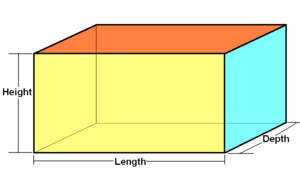Cuboid facts for kids
A cuboid is a 3D shape. Imagine a box, a brick, or a book – those are all cuboids! It's a solid shape with flat sides, straight edges, and sharp corners.
A cuboid is a type of polyhedron, which means it's a solid shape with flat faces. Most cuboids have faces that are rectangles, and these faces meet at right angles.
Every cuboid has some key features:
- It has 6 flat sides, called faces.
- It has 12 straight lines, called edges.
- It has 8 points, called corners or vertices.
Contents
Cuboid vs. Rectangle
What's the main difference between a cuboid and a rectangle? A rectangle is a flat, 2D shape. You can draw it on a piece of paper. A cuboid is a solid, 3D shape. You can hold it in your hand!
Cuboid vs. Cube
What about a cube? How is it different from a cuboid? A cube is a special kind of cuboid. In a cube, all 6 faces are squares, and all its edges are the same length. In a general cuboid, the faces are rectangles, and the length, width, and height can all be different. So, a cube is always a cuboid, but a cuboid is not always a cube!
Measuring a Cuboid
We can measure a cuboid in a few ways:
Volume of a Cuboid
The volume tells us how much space a cuboid takes up. Imagine filling the box with water – the volume is how much water it can hold. To find the volume, you multiply its length (l), width (b), and height (h):
- Volume of Cuboid = l × b × h
Surface Area of a Cuboid
The surface area tells us the total area of all its flat faces. Imagine you want to wrap a gift box – the surface area is how much wrapping paper you would need. To find the total surface area, you use this formula:
- Total Surface Area of Cuboid = 2 × (l × b + b × h + h × l)
See also
 In Spanish: Cuboide (geometría) para niños
In Spanish: Cuboide (geometría) para niños
 | Mary Eliza Mahoney |
 | Susie King Taylor |
 | Ida Gray |
 | Eliza Ann Grier |


